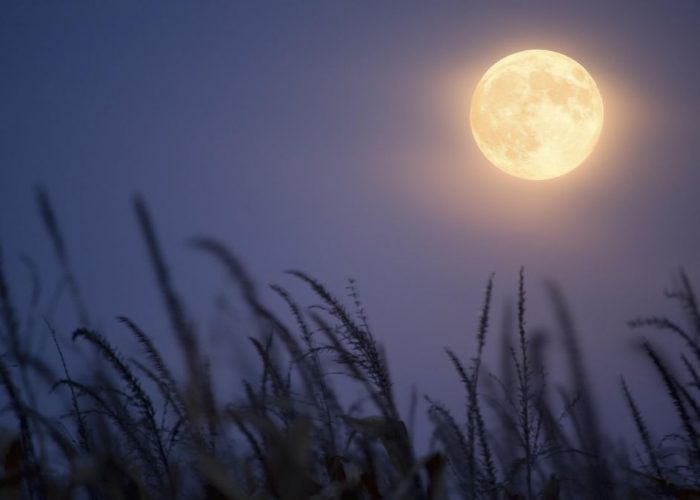‘Corn Moon’ or ‘Harvest Moon?’
getty
Does it matter what we call the full Moon?
This week sees the rise of the full Corn Moon, which will occur at precisely 05:22 UTC on Tuesday, September 2, 2020.
Septembers full Moon is traditionally called the Harvest Moon. Its one of the most famous full Moons of the year that, according to legend, shines brightly all night and allows the farmers to get their crops in late into the night.
Do you know any farmers who would be getting their crops in under a full Moon? said Martin Griffiths, a Wales-based science communicator, professional astronomer at Dark Sky Wales and author of Dark Land, Dark Skies: The Mabinogion in the Night Sky. Generally they do it during the day!
Most of the names we give to full Moons dont make much sense. Take Februarys Wolf Moon thats supposedly named after howling wolves, said Griffiths. Wolves howl every month!
Hes right, of course, but why is there confusion about what to call this months fairly well-known full Moon? And what about Octobers almost as famous Hunters Moon?
MORE FROM FORBESCorn Moon: Exactly When, Where And How You Can See The Full Moon At Its Delicate Best This WeekBy Jamie CarterWhat happened to Septembers Harvest Moon?
Septembers missing Harvest Moon is a casualty of the mis-match between the Moons orbit and the length of months.
The Harvest Moon is traditionally the one closest to the equinox around September 21, said Griffiths. Most years thats in September, but this year its going to be in October.
Normally Septembers Full Moon is close enough to the equinox to be considered the Harvest Moon, but this year the full Moon is occurring very early in the month, which happens about once every four years, said Tom Kerss, a British astronomy and science communicator who hosts the weekly Star Signs: Go Stargazing! podcast. So it’s technically the Corn Moon, which is a backup name for Septembers full moon.
So this year Septembers Harvest Moon becomes the Corn Moon, though happily that doesnt mean Octobers full Moon gets similarly lost because there are actually two of them.
So October 1s full Moon will be the Harvest Moon this year and October 31s full Moon will be the Hunters Moon.
Oddly, all of this occurs only once in a Blue Moon, which as well as being a famous saying, also happens to be true this year. There are two definitions of a Blue Moon, and both apply in Octoberso get ready for a Blue Harvest Moon followed by a Blue Hunters Halloween Moon.
Hang on. What? Why do we do this? As visual spectacle each months full Moon is virtually identical to the last. Is this lunacy?
The trick with a full Moon is to catch it at moonrise or moonset when it’s a muted orange.
getty
Why do we name the full Moon?
The thing is, we dont. Or, at least, we didnt. Weve never named the Moon as astronomers, said Griffiths. The names have allegedly come down from North American Indian law, from people who never wrote anything down, said Griffiths, who insists that hes prepared to look at historical evidence, but so far he hasnt found any. We just cant say that that Native American tribes called the Moon anything during different months.
Besides, 20 years ago no one was talking of the Wolf Moon or the Strawberry Moon; its something thats been pushed in North America as proof of an old culture, though it probably isnt anything of the sort.
Regardless of the Moon names origins, there are Moon names that are geographically problematic; Strawberry Moon and Harvest Moon sounds delightful to everyone the world over, but Beaver Moon and Sturgeon Moon are meaningless to countries without beavers and sturgeon. And yet their names now persist across the globe.
Blame the internet.
We give the Moon names because we’re fascinated by itit’s got nothing to do with astronomy.
getty
Does it matter what we call the full Moon?
To astronomers these names can be mundane, said Kerss, who recalls his ex-colleagues at Greenwich Observatory rolling their eyes whenever visitors wanted to discuss the names of the full Moons. If it gets people talking about the Moon, looking at the Moon, photographing it and writing social media posts about it then I think the names are a good thingthey add a bit of magic.
Full Moon names illicit the same response from astronomers as supermoons, which happen two or three times each year. Astronomers disregard them as faintly astrological and meaningless. Meanwhile, posts about supermoons continue to attract millions of readers. Names have their own valueif people go out and watch, and they wouldnt otherwise have done so, then that is a victory for astronomy communicators trying to get people into the subject, says Kerss.
After all, astronomers dont own the Moonbillions of people live their lives by the Moon in some way thanks to our historical fascination with it. The dates of countless religious occasionsincluding Hanukkah, Easter, Divali, Ramadan and Wesakare all determined by the phases of the Moon. The lunar calendars cultural ramifications very far-reachingwe still live our lives by the Moon, said Kerss. It speaks with our ancient relationship with the Moon.
Names for the full Moon have their place. They add some sparkle and remind us that the Moon belongs to everyone. However, the real magic is in witnessing the rise or set of a full Moonand you can find out here how, when and where to see the Corn Moon rise and set this week.
Wishing you clear skies and wide eyes.read more
Why Do We Give The Full Moon Strange Names? The Case Of This Week’s Missing ‘Harvest Moon’


